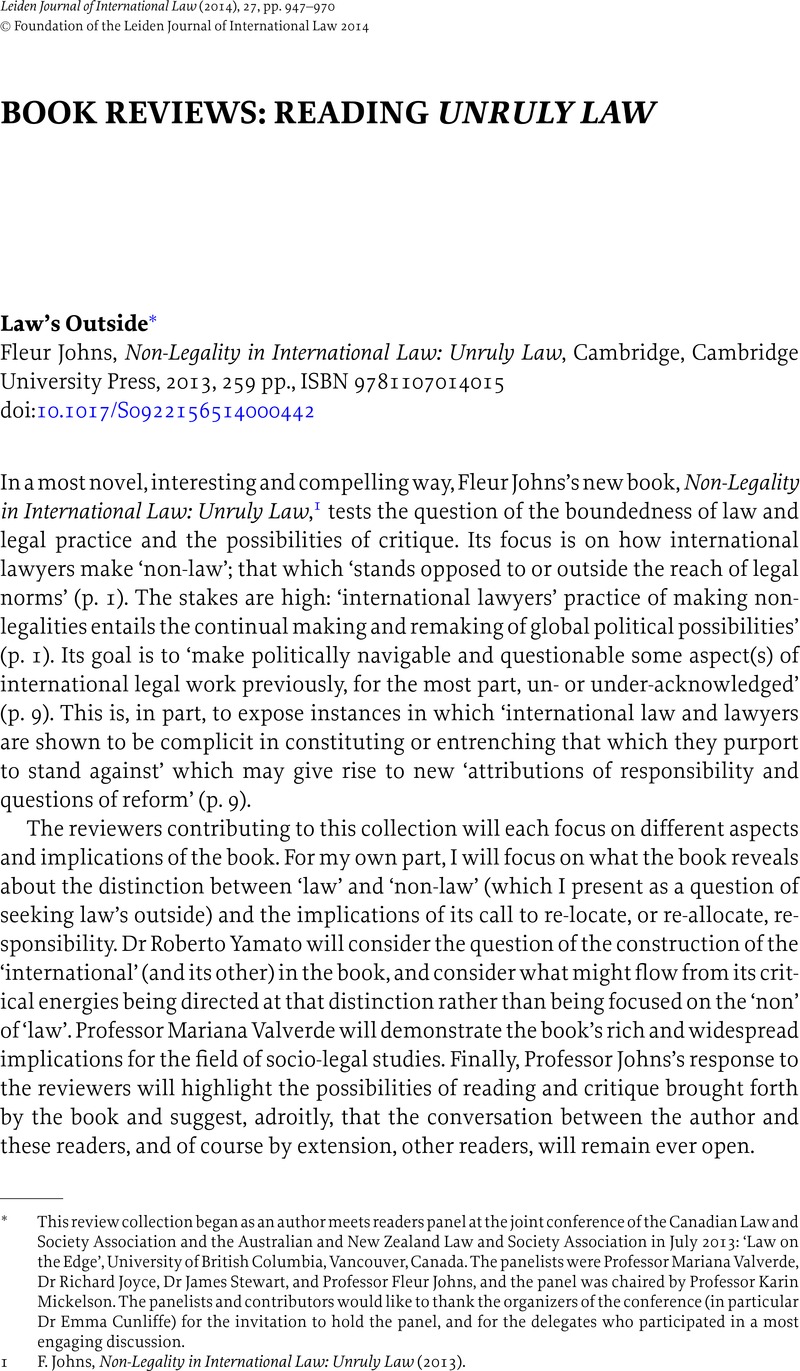No CrossRef data available.
Published online by Cambridge University Press: 06 November 2014

This review collection began as an author meets readers panel at the joint conference of the Canadian Law and Society Association and the Australian and New Zealand Law and Society Association in July 2013: ‘Law on the Edge’, University of British Columbia, Vancouver, Canada. The panelists were Professor Mariana Valverde, Dr Richard Joyce, Dr James Stewart, and Professor Fleur Johns, and the panel was chaired by Professor Karin Mickelson. The panelists and contributors would like to thank the organizers of the conference (in particular Dr Emma Cunliffe) for the invitation to hold the panel, and for the delegates who participated in a most engaging discussion.
1 F. Johns, Non-Legality in International Law: Unruly Law (2013).
2 M. Foucault, ‘Maurice Blanchot: The Thought From Outside’ (tr. B. Massumi), in M. Foucault and M. Blanchot, Foucault/Blanchot (1987), 34.
3 For another example outside the context of the torture memos, see the discussion of ‘reasonable case’ and ‘respectable argument’ in Lord Goldsmith's evidence to the Chilcot inquiry on the legal advice provided to the British Government on the then proposed invasion of Iraq in 2003: Lord Goldsmith, Statement to the Chilcot Inquiry, 4 January 2011, especially section 6, at <http://www.iraqinquiry.org.uk/media/50118/lord-goldsmith-statement-to-the-inquiry.pdf>. (last accessed 7 May 2014).
4 Here the reference to ‘beyond’ carries the sense of the standards coming from elsewhere but also their being beyond scrutiny or questioning (at 175).
5 Foucault, supra note 2, 34.
6 Ibid.
7 Ibid., 35.
8 Ibid., 33.
9 And so Fitzpatrick would find in a detailed examination on Foucault's writings on law that he evokes a ‘dimension of law in which the exteriority “finds itself” in-between the inside and the outside’ and that it is ‘law as exteriority that brings together yet holds necessarily apart law of the inside and law of the outside’: Fitzpatrick, P., ‘Foucault's Other Law’ in Golder, B. (ed), Re-reading Foucault: On Law, Power and Rights (2014), 53, 57Google Scholar; see also, P. Fitzpatrick, Modernism and the Grounds of Law (2001), 102–7.
10 J. Derrida, ‘Force of Law: The Mystical Foundation of Authority’ (tr. M. Quaintance), in J. Derrida, Acts of Religion, (2002), 257.
11 Ibid., 251 (and see 233–4).
12 J. Derrida, Rogues: Two Essays on Reason (tr. P.-A. Brault and M. Naas) (2005), 13.
13 Though this ‘deconstructed’ sovereignty is quite a different creature from the sovereignty commonly ascribed to the nation-state: see R. Joyce, Competing Sovereignties (2013), 91–111.
14 J. Derrida, Without Alibi (transl. Peggy Kamuf) (2002), xix.
15 See Johns, supra note 1, 49–59.